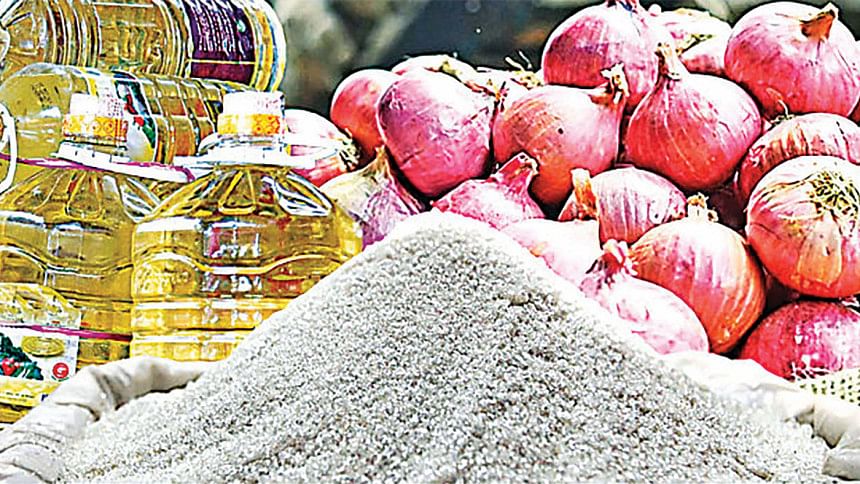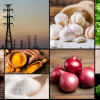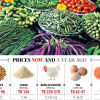No good news for consumers in Ramadan

With Ramadan just two days away, consumers will have to deal with the hiked prices of essential for the month of fasting this year.
The prices of onions; chickpeas; soybean; oil; sugar; some fruits, including dates; lentil, puffed rice; potatoes; aubergines; Isabgol (psyllium husk); green chili; coriander; lemons; mint leaves; sauces and juices, among more items, are all on the rise.
Most of these products are used to prepare iftar.
The Daily Star visited five kitchen markets in the capital over the past two days, including those in Mirpur, Purba Shewrapara, Kachukhet, Ibrahimpur, and Karwan Bazar, to gauge how the price shocks are affecting the people.
Five shopkeepers in Karwan Bazar told this correspondent that the sales of Ramadan essentials increased over the past two days.
While there is no shortage of the items, the prices for most of them have risen compared to the previous year, they said.
The common varieties of dates -- a must-have iftar item for many -- are being sold at Tk 500-1,100 a kg in Karwan Bazar and Kachukhet, up from last Ramadan's Tk 250-450.
Compared to last year, the prices of onions have risen by 157 percent, potatoes by 54 percent, garlic (imported) by 60 percent, ginger (local) by 82 percent, according to data published by the Trading Corporation of Bangladesh (TCB).
Onions are being sold at Tk 100-110 per kg, which was Tk 30-35 last year.
Md Gofran, proprietor of Cumilla General Store in Karwan Bazar, said that except for soybean oil, the prices of nearly all items have increased this year.
He is currently selling a litre of bottled soybean oil at Tk 160, which was Tk 170 last year.
Gofran said sugar was being sold at Tk 145 per kg, which was 115 last year; lentils at Tk 110-140, up from last year's Tk 95-130. Chickpeas are being sold at Tk 110 while last year the price was Tk 90.
Kheshari dal, used for making "piyaju" (onion tempuras), currently costs Tk 120 per kg, which was Tk 80 last year. Besides, chickpea gram flour, known as besan, is now Tk 140 a kg, an increase from last year's Tk 110 last year.
Munni Begum, a resident of Begunbari in Tejgaon, visited Karwan Bazar yesterday and expressed concern over the substantial increase in prices of Ramadan essentials.
"I came here to purchase Ramadan items for the first week of the month. Last year, I spent Tk 1,000 on these items. This time, I had to spend Tk 1,500.
"Our income hasn't increased, but our expenses have. Despite our financial constraints, we are compelled to spend more for Ramadan to ensure a decent meal."
The prices of fruits have also increased. During Ramadan, most consumers prefer dates, apples, malta, oranges, watermelons, pineapples, pears, grapes, pomegranates, and yellow papayas.
Md Shahjahan, a fruit seller in Kachukhet, said he was selling a kilo of apples at Tk 340, malta at Tk 320, oranges at Tk 340, pears at Tk 300, grapes at Tk 280, pomegranate at Tk 400, yellow papayas at Tk 200, and Indian jujube (kul boroi) at Tk 200.
He said prices of most fruits are 20-40 percent higher compared to the previous year.
"Due to dollar rate and import tax, prices of imported fruits are higher. As the demand of local fruits got higher, so the price increased."
Besides, the demand of aubergine, green chili, coriander, mint and tomato have increased ahead of Ramadan.
Sellers said that prices of these items have increased by Tk 20-40 per kg.
Ghulam Rahman, president of the Consumers Association of Bangladesh, told The Daily Star that during high inflation, when demands for various items rise, sellers often take advantage of the situation to maximise their profits.
To address this issue, he emphasised the need to increase the supply of these items and promote healthy competition. "By doing so, attempts to exploit the situation for undue profit can be thwarted."


 For all latest news, follow The Daily Star's Google News channel.
For all latest news, follow The Daily Star's Google News channel. 








Comments